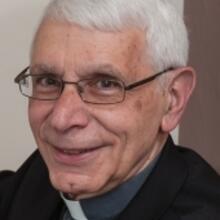Karl Rahner, S.J., was indisputably one of 20th-century Catholicism’s preeminent and most influential theologians. His long theological ministry spanned some 50 years, from the early 1930s until his death in 1984.
One of his writings that has always fascinated me is an essay entitled “Christian Living Formerly and Today.” The essay appeared just as the Second Vatican Council was ending. It contains the prophetic and often-quoted sentence: “The devout Christian of the future will either be a ‘mystic’—someone who has ‘experienced something’—or will cease to be anything at all.”
The essay strikes me as prophetic because in the ensuing 55 years since it first appeared, there has been a catastrophic decline in the Western world in the number of active and committed Catholics. To designate oneself as “none” (at least from the religious point of view) can indeed sound like “ceasing to be anything at all.”
One of the writings of Karl Rahner that has always fascinated me is an essay entitled “Christian Living Formerly and Today.”
The reasons for the decline are of course many. They are both ecclesial (the sexual abuse scandal prominent among them) and cultural (the sexual revolution, the prevalence of a consumerist mindset and more). But, guided by Rahner, one might justly ask: Does it also indicate a deficit of “experience?” Put even more provocatively: Is it the failure to actually become a “mystic,” one who has experienced the faith at a certain depth and intensity?
Yet the Rahner essay also contains some perplexities.
For example, it was always puzzling to me why Rahner said “experience something,” rather than experience Someone. For at the center of Christian faith and living, formerly and today, is Jesus Christ. As the Letter to the Hebrews confesses: “Jesus Christ, the same yesterday, today and for the ages”—a profession of faith notably echoed by the Second Vatican Council’s “Gaudium et Spes.” At the very heart of St. Paul’s apostolic vocation lies his faith experience of the Lord Jesus, “who loved me and gave himself for me” (Gal 2:20). And, in the Letter to the Ephesians, he prays earnestly that all the saints may come “to know the love of Christ which surpasses knowledge” and thus “be filled with all the fullness of God” (Eph 3:19).
Thus I was delighted when another essay by Rahner appeared some years later. In 1982, only two years before his death, he wrote an article entitled “What Does It Mean to Love Jesus?” Though dense, in the usual Rahnerian manner, it focused explicitly upon the Christian’s relation to his or her living savior. Rahner insists: “One can love Jesus, love him in himself, in true, genuine, immediate love.” And he includes these remarkable words (spoken, he tells us, to the surprise of a rather “rationalistic” colleague): “You’re actually only really dealing with Jesus when you throw your arms around him and realize right down to the bottom of your being that this is something you can still do today.”
Karl Rahner: “You’re actually only really dealing with Jesus when you throw your arms around him and realize right down to the bottom of your being that this is something you can still do today.”
So the Christian of the future will be one who has experienced a life-changing encounter with the living Jesus Christ. As Pope Benedict XVI wrote in his first encyclical, “Deus Caritas Est,” “Being Christian is not the result of an ethical choice or a lofty idea, but the encounter with an event, a person, who gives life a new horizon and a decisive direction.”
And this encounter gives rise to a relationship with Jesus that certainly admits of endless growth and deepening but is even now marked by intimate knowledge and love—“abiding” in him, as Jesus himself exhorts the disciples during the Farewell Discourse in John’s Gospel. Indeed, as this relationship, this abiding matures, it more and more assumes the form of whole-hearted attention to and affective embrace of the one whom one loves. Indeed, “a throwing one’s arms” about the Lord of one’s life, as Rahner rather boldly declares to the evident dismay of his scholarly colleague.
Rahner certainly does not envision a “physical” embrace. Nonetheless, the embrace of Jesus is uniquely “tangible,” enlisting the full range of what the mystical tradition terms the “spiritual senses.” One recalls Augustine’s exultation in the magnificent Book Ten of his Confessions. Here Augustine struggles to give voice to the experience of his love for God and admits it far transcends physical sweetness or fragrance, brightness or beauty. And yet, he affirms: “in a sense I do love light and melody and fragrance and food and embrace when I love my God...when that light shines upon my soul which no place can contain, that voice sounds which no time can take from me, when I breathe that fragrance which no wind scatters, I eat the food which is not lessened by eating, and I lie in that embrace which satiety never comes to sunder.”
Augustine confirms (or better “inspires”) Rahner’s conviction that in the today of faith one can embrace the very Lord of life.
Note how Augustine draws upon physical sensory experience—sight, hearing, tasting, touching—to point toward the experience of senses transformed so as to perceive the hidden but real presence of God in Christ. Thus Augustine confirms (or better “inspires”) Rahner’s conviction that in the today of faith one can embrace the very Lord of life. For Augustine confesses that he could only find the way to the true God when he “embraced the Mediator between God and man, the man Christ Jesus, who is above all things, God blessed forever,” yet who humbled himself to embody and become the believer’s spiritual food and drink.
So we come to a final point worth noting. Two of Rahner’s very first theological essays, dating from the early 1930s, studied the notion of the “spiritual senses” in the writings of the early church father Origen and in the medieval Augustinian tradition. It would seem, then, that Rahner returned toward the end of his life to those early explorations on the spiritual senses and the Christian mystical tradition. In doing so he returned to the wisdom of the concluding line of T.S. Eliot’s “East Coker”: “In my end is my beginning.”
Throughout his theological journey, Rahner sought to broaden our appreciation of the mystical, not as “extracurricular” to the Christian way, reserved for the privileged few, but as intrinsic to Christian living, yesterday and today. He challenges us to extend our imagination beyond the examples of those classical mystics who exhibit extraordinary spiritual gifts. He sought to “democratize” mystical experience, viewing it as the full flowering of the Christian life: a life of relations transformed in Christ, heralding the new creation. Though employing different dictions, I am sure Rahner would celebrate the insights of his fellow Jesuit, Gerard Manley Hopkins, S.J. Purified senses enable us to perceive that “Christ plays in ten thousand places, lovely in limbs, and lovely in eyes not his.”
In and through all the intricacies of his signature “transcendental method,” Rahner’s pole star remained the love of Jesus, who alone fulfills our human desire for unconditional love and communion. Communion not only with the Lord but also with all the members of his body. For loving Jesus is always inseparable from loving those who Jesus loves.










